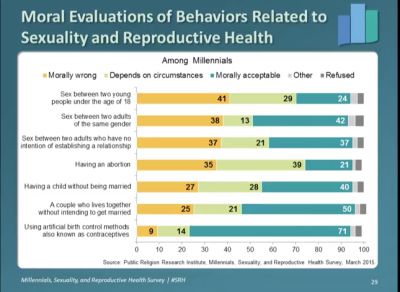Millennial majority approves abortion, widely supports contraception availability

WASHINGTON (Christian Examiner) -- A nationwide survey released by the Public Religion Research Institute Friday confirms previous research about millennials' support for abortion and offered insights about this generation's views about contraception.
A majority of those polled, 56 percent, opposed making it more difficult to obtain an abortion, compared to 40 percent who favored such legislation.
This matches a March 2014 survey by the Pew Research Center which found 56 percent of milliennials said "abortion should be legal in all or most cases."
In the PRRI study, there were some predictable differences by geography.
Millennial majorities in the Northeast (64 percent) and West (55 percent) say they oppose making it more difficult for a woman to get an abortion.
However, it was surprising that there were more in the South who favored this position (58 percent) than in the West, and, that millennials in the Midwest were evenly split about the issue (47 percent oppose, 48 percent favor).
There was one limitation expressed by respondents: 59 percent opposed making abortion services available to women as young as age 16, unless there is parental approval. About 37 percent objected to requiring a parent's involvement.
Despite majority favorability toward abortion, most of the survey takers did not claim to be "pro-choice." Only 27 percent chose that label. An equal amount say both "pro-choice" and "pro-life" describe their views, a quarter say they identify exclusively as "pro-life," and, neither label is a fit for another 22 percent.
CONTRACEPTION
"Majorities of both women and men in the Millennial Generation believe access to contraception is critical not just for reproductive health, but also for the financial well-being of women," said Dr. Robert P. Jones, CEO of Public Religion Research Institute. These views were held across racial and ethnic lines for 64 percent of women and 55 percent of men, according to a news release.
Most of the participants, 71 percent, said the use of contraception was "morally acceptable" while 14 percent claimed it depended on the situation. Fewer than one in ten (9 percent) stated contraception use was morally wrong.
"Few millennials have moral qualms about birth control, and they generally support policies to make contraception widely available and affordable," Jones noted.
During the Feb. 12-15 survey, which questioned 2,314 adults between the ages of 18-35 years old, the institute also found that 78 percent favored "making all forms of legal contraception readily available on college campuses."
Additionally, 81 percent supported "increasing access to contraception for women who cannot afford it" while 55 percent did not think a prescription should be required to obtain emergency contraception like the "morning after" pill.
MORAL RELATIVISM
Relativism was apparent among millennials' moral views.
"One of the things we find is that millennials factor in the situation before they're willing to make abstract moral pronouncements," Jones said in a forum presentation of the study's data.
"A big number of millennials across these issues say that their moral evaluation depends on the circumstances and the one that sticks out the most is having an abortion," he said. "You'll see here that nearly 4 in 10 millennials say their moral evaluation of whether having an abortion is morally acceptable or not depends on the situation at hand."
RELATED ISSUES
Other notable findings in the survey included millennials attitudes towards sexual education and their exposure to sexual assault.
According to the PRRI survey, 75 percent of respondents favor teaching "comprehensive sex education" in public schools, a statistic that held true across all races, ethnicities, and religious groups. About 73 percent said sexual assaults are somewhat common on college campuses and 53 percent said they were somewhat common in high schools.